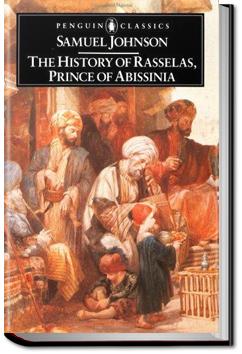UNLIMITED Audiobooks and eBooks
Over 40,000 books & works on all major devices
Get ALL YOU CAN for FREE for 30 days!
Rasselas, Prince of Abyssinia
Samuel Johnson
Book Overview:
In this enchanting fable, Rasselas and his retinue burrow their way out of the totalitarian paradise of the Happy Valley in search of that triad of eighteenth-century aspiration – life, liberty and happiness.
According to that quirky authority, James Boswell, Johnson penned his only work of prose fiction in a handful of days to cover the cost of his mother’s funeral. The stylistic elegance of the book and its wide-ranging philosophical concerns give no hint of haste or superficiality.
Among other still burning issues Johnson’s characters pursue questions of education, colonialism, the nature of the soul and even climate alteration.
Johnson’s profoundest concern, however, is with the alternating attractions of solitude and social participation, seen not only as the ultimate life-choice but as the arena in which are played out the deepest fears of the individual: “Of the uncertainties of our present state, the most dreadful and alarming is the uncertain continuance of Reason.”
In this enchanting fable, Rasselas and his retinue burrow their way out of the totalitarian paradise of the Happy Valley in search of that triad of eighteenth-century aspiration – life, liberty and happiness.
According to that quirky authority, James Boswell, Johnson penned his only work of prose fiction in a handful of days to cover the cost of his mother’s funeral. The stylistic elegance of the book and its wide-ranging philosophical concerns give no hint of haste or superficiality.
Among other still burning issues Johnson’s characters pursue questions of education, colonialism, the nature of the soul and even climate alteration.
Johnson’s profoundest concern, however, is with the alternating attractions of solitude and social participation, seen not only as the ultimate life-choice but as the arena in which are played out the deepest fears of the individual: “Of the uncertainties of our present state, the most dreadful and alarming is the uncertain continuance of Reason.”
How does All You Can Books work?
All You Can Books gives you UNLIMITED access to over 40,000 Audiobooks, eBooks, and Foreign Language courses. Download as many audiobooks, ebooks, language audio courses, and language e-workbooks as you want during the FREE trial and it's all yours to keep even if you cancel during the FREE trial. The service works on any major device including computers, smartphones, music players, e-readers, and tablets. You can try the service for FREE for 30 days then it's just $19.99 per month after that. So for the price everyone else charges for just 1 book, we offer you UNLIMITED audio books, e-books and language courses to download and enjoy as you please. No restrictions.
“The labour of rising from the ground,” said the artist, “will be great, as we see it in the heavier domestic fowls; but as we mount higher the earth’s attraction and the body’s gravity will be gradually diminished, till we shall arrive at a region where the man shall float in the air without any tendency to fall; no care will then be necessary but to move forward, which the gentlest impulse will effect. You, sir, whose curiosity is so extensive, will easily conceive with what pleasure a philosopher, furnished with wings and hovering in the sky, would see the earth and all its inhabitants rolling beneath him, and presenting to him successively, by its diurnal motion, all the countrie. . . Read More
Try now for FREE!

"Love your service - thanks so much for what you do!"
- Customer Cathryn Mazer
"I did not realize that you would have so many audio books I would enjoy"
- Customer Sharon Morrison
"For all my fellow Audio Book & E-Book regulars:
This is about as close to nirvana as I have found!"
- Twitter post from @bobbyekat



Community Reviews
I think this is my eighth year to teach this short work, and I still delight in Johnson's understated humor. The poor prince! To encounter almost every known philosophy and way of life and still not know what to do with himself. I do like this Oxford edition for its fine notes and cross references,
If you think this is too ,too old hat for you then perhaps the fact that Jane Austen was a BIG fan may break down your prejudices. And pride? She loved and inherited Johnson's neoclassical balance of style exemplified in such of his sentences as:"Remarriage is the triumph of hope over experience" a
A passing acquaintance with Samuel Johnson will reveal that the man could write splendidly. He possessed, by all accounts, an unapproachable intellect. His literary works are reminiscent of Voltaire's: witty, erudite, vast, and infinitely readable. His travel accounts and the biography by Boswell ar
Written in one week to defray the cost of his mother's funeral, Johnson's moral tale is a superior example of the prose of its era, and its era—the Age of Enlightenment—is renowned for the quality of its prose. It is true that Candide—written in 1759, the same year as Rasselas--excels Johnson's work
I'm giving this five stars, because it's right up my alley style-wise (the Eastern pilgrimage tale), and I can't stop thinking about some clever points made even early on. It's sort of Gibran's The Prophet meets Candide, but with a more plausible outcome than either. I cannot find anything to compla